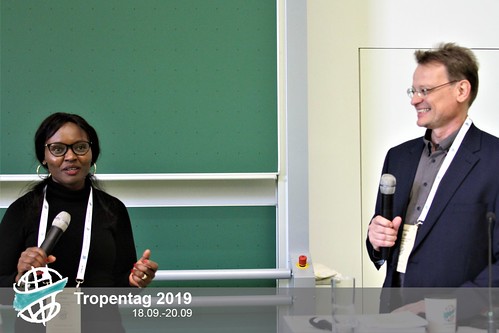Blogs
The flavour of good intention
Thu, 09/19/2019 - 13:19 — AhmedWhy chocolate? In 2018, chocolate consumption worth about 828 billion USD in USA. Per capita consumption was about 5.5kg and 8.5kg in USA and Germany, respectively. The main driver for such higher chocolate consumption in Europe comapred to the USA is the flavour. A keynote speaker, Carla Martin, Founder and Executive Director of The Fine Cacao and Chocolate Institute said it is not just chocolate, “it is a flavour that has value”. “The best flavour shows status, enjoyment and so on but, farmers get less credit on it.” The best flavour of the food can be used as a factor to express originality and status. However, the question is are farmers getting the right profit value of their cacao?
 Youtube video: Carla shares her love & enthusiasm for cacao
Youtube video: Carla shares her love & enthusiasm for cacao
The world has only 10 harvests more!
Thu, 09/19/2019 - 09:31 — Oladokun
Hans H. Ruthenberg - Graduate Award 2019: University of Bonn wins it all!
Wed, 09/18/2019 - 20:39 — Oladokun
Hundreds of people at the #Tropentag2019 stood still to reward academic hard-work, dedication and innovation, as the 21st edition of the Hans H. Ruthenberg - Graduate Award was given out. This prestigious award, instituted in honour of the famous German Agriculturist- Prof. Dr. Hans-Hartwig Ruthenberg, has been awarded to 54 recipients since 1999 for outstanding scholarly work on food security.
Plant trees, change minds
Wed, 09/18/2019 - 18:18 — Martinelli
Youths: we can feed the world, but…
Wed, 09/18/2019 - 15:35 — Oladokun
The 21st edition of the largest gathering on tropical and subtropical agriculture, Tropentag, kick-started today with a pre-conference workshop titled “Supporting youth in agriculture and research: Role of youth-based organisations”. This session was facilitated by two #YouthinAg centred organisation; YPARD and Agrinatura. With global youth membership over 16,000 and support from FAO and Swiss Agency for Development and Cooperation, YPARD has been providing #YouthinAg support and mentorship for the past 11 years. The Agrinatura also plays the same role with the support received from major European research and education stakeholders. If you would agree with me, the session was facilitated by competent hands.
Is nutrition sensitive value chain a solution for sustainable food system?
Wed, 09/18/2019 - 15:31 — Ahmed
By adopting the NSVC framework, a project is able to improve diets of vulnerable rural and urban consumers through increased consumption of more diverse, safe and nutrient-dense foods, which are sourced directly from smallholder farmers. Therefore, NSVCs touch everyone in the chain from farmers, wholesalers, processors, consumers and state actors (policies, standards and safety authorities, NGOs etc.).
Make science, not war
Wed, 09/18/2019 - 11:46 — MartinelliOn an attempt to understand this global and complex topic, scientists from different areas got together in Kassel yesterday afternoon, kicking off the Conference Tropentag 2019. Organized by the Center for Development Research (ZEF) at University of Bonn, the workshop called attention to a potential (and surprising) solution: ask the locals! Listening and integrating their knowledge allows easier understanding of where the conflict is happening, its intensity and action taken when they scale up.

Herzlich Willkommen!
Tue, 09/17/2019 - 17:35 — lloydGuten Tag!
It is the day before the main activities of Tropentag 2019 kick off in Kassel, Germany and preparations by the student reporter team are in full swing.
Tropentag 2019 is full of promise, there are 24 sessions of oral presentations, with 107 individual presentations, as well as 29 guided poster sessions, with 310 individual poster presentations. Tropentag 2019 is attended by almost 900 people, hailing from a staggering 85 countries. Importantly, in this year's Tropentag conference bag, there is a reuseable cup for beverage consumption, and almost 1/3 of attendees chose not to recieve the printed book of abstracts, saving 250 printed copies. #GoGreta !
As the conference unfolds, you'll see us Student Reporters in our white t-shirts (we'll be taking great care not to spill on them) running around like busy little bees. Please feel free to approach us if you'd like your poster, presentation or general self documented here within our blog or on Twitter, Flickr, YouTube, Instagram, or Facebook.
You can follow us at #Tropentag2019, and we wish you all great success and much fun over the coming days.




